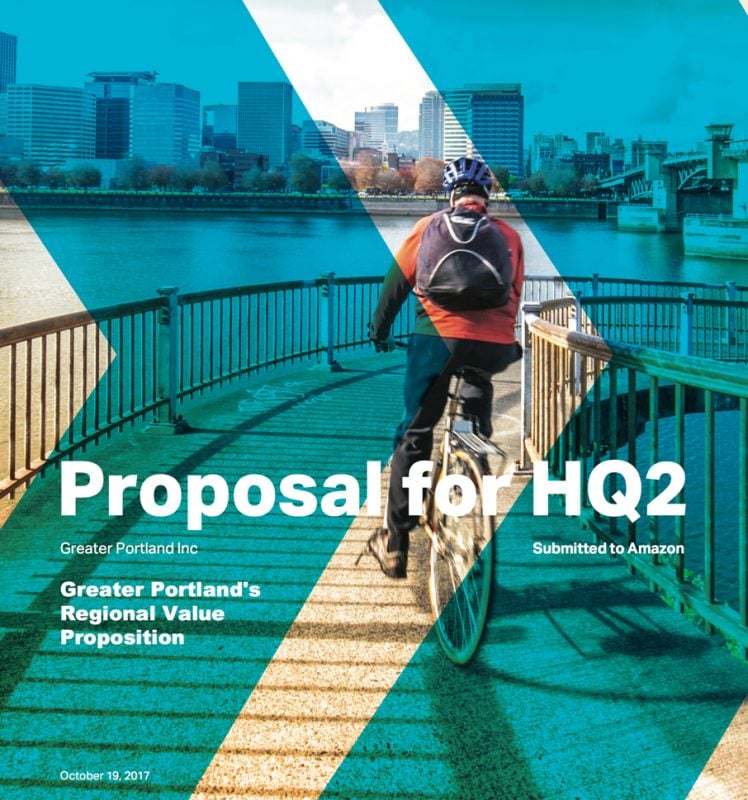
There can no longer be any doubt that bicycling is a major part of our region’s “value proposition” to businesses.
A reference to bicycling occurs on seven of the 23 pages that a local business group has sent to Amazon as our region’s pitch for the company’s second headquarters location. Among those references is a starring role on the cover of the pitch which shows a man bicycling down the corkscrew ramp from the Morrison Bridge to the Eastbank Esplanade with the Portland skyline in the background.
The pitch, created by Greater Portland, Inc. and sent to Amazon yesterday, aims to lure the juggernaut corporation with stats and promises organized into four main categories: Talent and Workforce, Quality of Life, Global Connections, and Business Ecosystem. Bicycling is represented at least once in each of those four chapters of the pitch.
Advertisement
Business Ecosystem…
Transit and other non single-occupancy vehicle transportation are mentioned many times as well.
Funny how our real, local politics still supports cars and driving (the Portland Business Alliance could easily be mistaken for a driving advocacy group), yet when we need to put our best foot forward and look presentable, we’re careful to hide our outdated and cowardly allegience to automobiles.
Maybe if we were bold enough to actually lead and legislate in a way that manifested the dreamy, bike and transit-centric fairy-tale depicted in pitches like this, we’d be so happy and fulfilled we wouldn’t be compelled to woo massive, subsidy-seeking, global corporations in order to gain validation as a world-class city.
I like Aaron Brown’s idea, expressed on Twitter this morning when we posted the pitch cover: “Instead of a bike tax, PDX needs a “bikewashing tax,” where corporate/civic boosters who use pics of bikes have to pay for more bike lanes.”
You can download the pitch here.
— Jonathan Maus: (503) 706-8804, @jonathan_maus on Twitter and jonathan@bikeportland.org
Never miss a story. Sign-up for the daily BP Headlines email.
BikePortland needs your support.



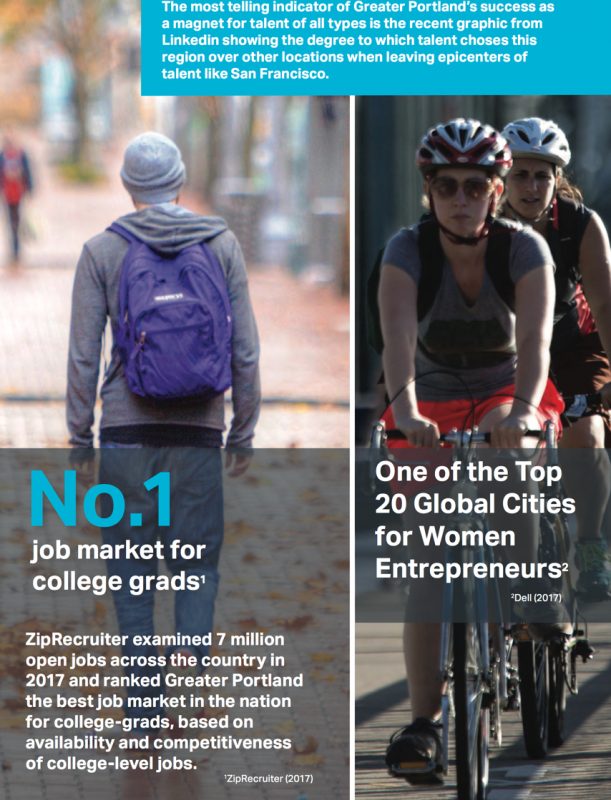
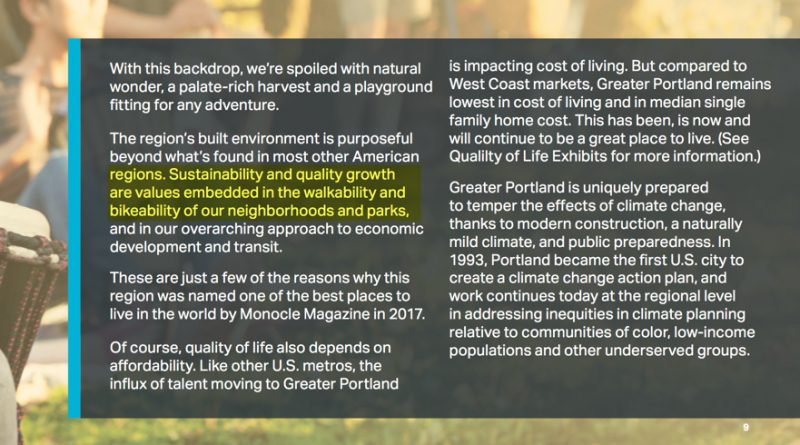
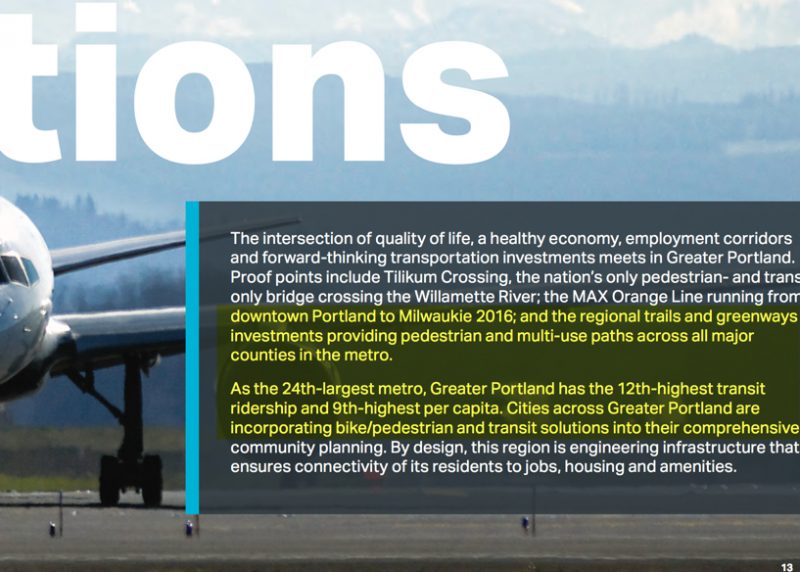
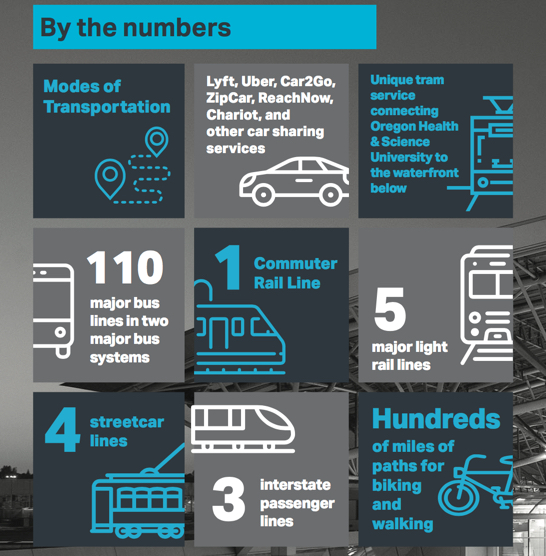
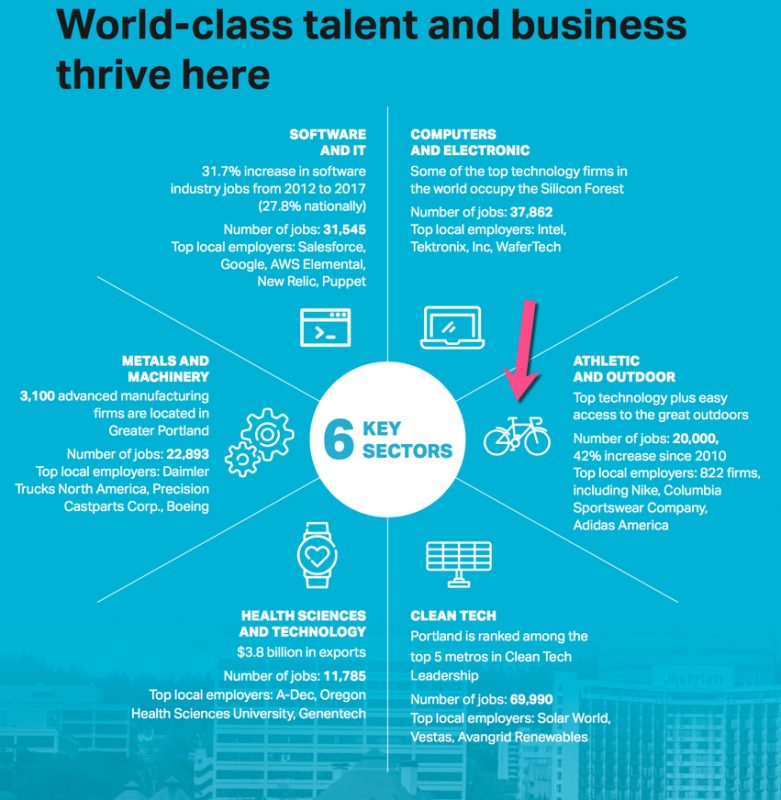
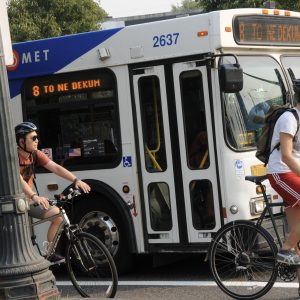


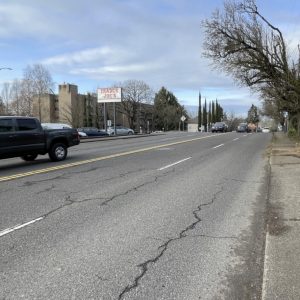
Thanks for reading.
BikePortland has served this community with independent community journalism since 2005. We rely on subscriptions from readers like you to survive. Your financial support is vital in keeping this valuable resource alive and well.
Please subscribe today to strengthen and expand our work.
Portland is not going to be the location for amazon’s hq2.
You do NOT want portland to be the next location for amazon’s hq2.
I agree! I’m not worried that we’ll “win,” but if we do, I’m outta here.
Portland’s job market for tech is already pretty tight and it doesn’t have the major university in the market to generate the sort of corporate/academic partnerships that sort of incubate a community like Seattle and Silicon Valley (yes we have PSU but PSU doesn’t have the research programs that really reinforce the backbone of the tech workforce).
Reminds me of the real estate developers who put pictures of the cool local bars and restaurants near their new crackerbox apartments on their websites. Even though they wiped out the old portland music venue and food cart pod when they built their building full of overpriced studio’s
It’s weird the way people describe food cart pods as being this “Old Portland” thing when the explosion of food carts happened less than 10 years ago.
Too soon, man.
“Old Portland” died the year each of those people moved here. “It was cool when I was here, but ow all of those other people moving here have ruined it.”
cute…
…until you realize that population growth corresponds to ever greater demands on everything: water, housing, energy, air, asphalt, parking spaces, recreation, schools, police, fossil fuels – smaller slices of the pie, especially for those less privileged, less wealthy, than the majority of us who post here. There are very real tradeoffs that we may only experience indirectly and therefore be inclined to shrug off, but that makes them no less real for the displaced, the crowded out, the stuck-in-traffic-on-the-way-to-their-ever-further-away-job.
Yes, the explosion of food cards is recent, but the existence of them is not. It was one of the pleasant surprises I noticed upon moving to Portland more than 20 years ago. There weren’t very many – just a few near Pioneer Courthouse Square plus a few scattered around other locations – but they did exist. And they didn’t exist in Seattle, where I’d moved from. So I’d go with Old Portland = TRUE for food carts.
Cities falling all over themselves to give away millions in tax brakes to Amazon is truly disturbing.
Ted Wheeler recently promised at a public meeting that no tax breaks would be offered to Amazon.
Like our housing shortage wasn’t bad enough already….
Bikewashing to attract a predatory capitalist monopsony is disgusting. If our millionaire Mayor had compassion for working class folk he would be calling for Amazon to be busted up, not rewarded with billions of tax-payer subsidies.
Well-written incisive piece. I wonder if Amazon came to Portland if they would be end up siding with the pro-car PBA in local political matters. I think Portland should be very coy with Amazon. Let them earn the chance to locate here. Maybe they should be sending us fancy proposals.
Amazon is quite progressive when compared with other large tech companies. They build their campus in downtown Seattle, rather than a sprawling suburban office park. They fund the streetcar, and shuttle busses in Seattle. Landing Amazon in Portland would change the city, in a good way. The additional tax revenue could be used for bike lanes and transit in the area.
I am not sure we could build enough bike lanes to escape an additional 20,000 Amazombies racing around town in motorcars.
Right? It’s worth thinking about how a more urban-minded business with a progressive track record like you mentioned might actually move PBA and others into modern times. Particularly a heavyweight like Amazon.
Now I don’t think that realistically Amazon is coming to Portland, we don’t have a big enough talent pool for what they are seeking and I think we are a bit too close to their current HQ. BUT, I do think this application is a greater for Greater Portland to advertise other (probably smaller, less prestigious) companies with highly-paid workforces that we are a city worth considering. I’m of two minds on that. I chafe at what the growth in high-paying jobs is doing to the cost of living in Portland, but I also embrace the growing tax base that this city desperately needs. In addition, this City needs some big anchor companies that can engage in corporate philanthropy, sponsorship, and support of local organizations, causes, schools, etc.
Sad, we were once a city that made the worlds best electronic instruments, lift-trucks and sportswear and now we grovel to lure a company who’s main business is figuring out cheaper ways to mail catfood.
My cat demands I look into that.
We have had a decade of intense growth and we cannot hire cops, clean up homeless camps, fix roads, etc…
Yeah, all those jobs and companies and new buildings really pay their way, right?
Cities are going to pay Amazon to come, why do you possibly think they will pay enough taxes to accommodate the growth?
Point to me examples where growth paid its way.
What if Amazon did those positive things in a City that might benefit from them even more than Portland?
“Amazon is quite progressive”
You’ve got to be kidding.
https://ilsr.org/amazon-stranglehold/
and the full report:
https://ilsr.org/wp-content/uploads/2016/11/ILSR_AmazonReport_final.pdf
As part of a negotiation with City of Seattle, Amazon agreed to build a protected bike lane on 7th Ave (https://goo.gl/maps/mUKaJPvzfoR2). I haven’t ridden on yet, but it looks a lot nicer than anything that has been built in downtown Portland to-date.
I walked down 7th when I was in Seattle earlier this month: https://www.instagram.com/p/BZr81M7lwzf/
It’s protected, and it’s a relatively short segment (couple of blocks at the moment) – but you have to merge with pedestrians prior to each intersection. It’s actually not a good design at all.
Amazon is certainly pro-robocar (self-driving) as if the technology is inevitable rather than impractical, ineffective, unreliable, unsafe and would only make traffic worse if it were possible, which it isn’t. Amazon is a monopoly putting smaller scale retail establishments out of business and in the process increasing distances and fuel/energy spent to deliver their boxed products. Amazon pretends drone delivery is possible as demonstrated only in Hollywood sci fi graphic animation.
Why don’t they include a chart that shows how cycling #’s have dropped, fatalities are on the rise since Vision Zero, and commuting time have skyrocketed the past few years.
Hope everyone is supporting their LBS, they actually pay taxes toward infrastructure. ♀️ 🙂
I don’t think pictures of bikes will beat out the $140,000 per job in subsidies and tax breaks that New Jersey is offering. Amazon and the garden state deserve each other.
Thanks, Jonathan, for pulling no punches when it comes to the blatant bikewashing.
Dis-gusting!
And we wonder why most people are cynical about politics.
Amazon: Walmart of the internet.
PDX is NOT going to be the next HQ. Too close to Seattle. EVERY dollar spent on this was a waste of taxpayer money.
Sell it on bikes, then choke them out with traffic, brilliant. Should also give them more ammo for widening I-5 and all the other cars at all costs crap they are peddling.
The choking is part of what makes cycling attractive.
I’ve driven to work zero times since moving to Portland. While I am highly biased towards cycling, there have been a few times I would have driven if the experience weren’t so hopeless.
You should be praising the crackerbox buildings that sell the idea of cycling is a good thing. Most of them don’t add parking which only perpetuates the idea that owning a bike is “cool.” It seems hypercritical to go against any form or fashion of cycling publicity because any attention helps your voice. Most folks get turned off when they hear spoiled children whine.
This post is actually not hypercritical—it’s mostly just stating the facts, yet it’s written in such a way that you project your own feelings onto it 🙂
Is it really bikewashing if the 1st pictured biked doesn’t have fenders?!
Most people only commute in the Summer…
Why isn’t this pitch highlighting the new bike tax?
Shhhh…. You’re not supposed to know this, but Portland is NOT on the short list.
Even if reality doesn’t measure up to rhetoric, I have no problem with bikewashing or see any benefit to harshing on it. If nothing else, it contributes to an expectation that bikes will be out there and encouraged. That can only help make those things happen for real.
Dumping on bikewashing only helps perpetuate the car centric myth that cycling isn’t a viable way to get around.
I love your comment because it takes this into a “big issue” discussion.
I agree there can be those benefits. On the other hand, it can feed Portland’s huge problem–the “We’re wonderful” attitude that blinds people to the fact that Portland isn’t as great as some people make it out to be.
Look at land use, recycling, parks…anything “green”–all paraded out when Portland describes why it’s wonderful. Then you go to other cities and see they’re doing just as well or better. If you lobby for better performance here–or worse, question whatever is being proposed–you have to go through a whole phase of getting beyond people’s “But we’re wonderful, so what we’re planning must be wonderful” attitude (especially in government).
So bikewashing–or whatever “washing” is going on–sometimes tends to work to convince people that things are better than they really are.
I whole-heartedly agree. It’s difficult to make positive changes when people, particularly city staff, refuse to acknowledge that there are deficiencies. Worse yet, people who point out our failures to live up to all the bikewashing and other greenwashing, are often attacked as being negative Nellie’s and silenced.
I honestly don’t see how anything can be improved without first admitting that improvement is possible, which means looking at and acknowledging where we’re failing. Is there any other way forward?
Dwelling upon failure is not the same is recognizing and pursuing opportunities for improvement. The way you get ahead is by learning from mistakes and building on success.
Perpetually declaring everything to be a failure is a path to nowhere. Rather than be a motivation for improvement, it calls into question whether the goals are realistic or should even be attempted.
In any case, constantly complaining has the effect of silencing those doing the complaining. It’s the “boy who cried wolf” dynamic — whine about everything, and no one takes you seriously even when you have a legitimate beef.
Yes, learning from mistakes and building on success is a good strategy.
Unfortunately, the rest of what you wrote sounds like what City staff and others too often tell people who “complain”. It’s not complaining, it’s pointing out problems with proposals which would improve the results if they were addressed. But the legitimate criticism gets responded to with being ignored first, then if you press on, you get told you’re “complaining” and “whining”. It doesn’t happen always, or even most of the time, but it’s enough to be frustrating and damaging.
Hence there are situations here where (as an example) City staff will forge forward on plans for a project or new regulations for a year, only to have them thrown out by City Council, for the same reasons people were telling staff for a year, and getting dismissed as “complainers”. It benefits nobody.
And specifically in regard to “—washing”, the people who won’t listen to critcism use the “—washing” to convince others to ignore the criticisms. In other words (as another example) the result of their bikewashing (saying how great biking is) is to undermine bike-related improvements.
A large percentage of the people I know in the real world regard it as complaining and whining. Frankly, I do too. Whenever something is done, you can count on complaints on how it is wholly inadequate. So the same areas get loads of attention while others languish.
Overuse of intentionally charged terms like “bikewashing” plays right into this dynamic and is a great way to get everyone to tune you out. The idea that those pimping PDX’s bike vibe are using it to undermine improvements for cycling is ludicrous.
If it’s really so unsafe, why on earth would you expect anyone to ride and why do you do it yourself? After all these years, why would you expect anyone to believe that committing more funds would make things safe if it’s still so bad after all this time?
You’re proving my point. I’m saying there are lots of times when criticism that everyone would benefit from taking seriously is dismissed as whining and complaining, and you respond by saying, “A large percentage of the people I know in the real world regard it as complaining and whining. Frankly, I do too.”
Exactly my point.
And I never said anything about biking being unsafe. You made that assumption. In fact, I wasn’t just talking about biking at all, which is why I mentioned “land use, recycling, parks, anything ‘green’… ” and how they all get “—washed”. You had some sort of obstruction in your thinking that led you to conclude that “he thinks biking is unsafe” and then came to a conclusion about what I was saying that had nothing to do with what I wrote.
Again, that’s exactly the unproductive thing that I was pointing out people do, and it gets in the way of constructive discussion (or “whining and complaining”) as it’s also called.
You wrote, ” The idea that those pimping PDX’s bike vibe are using it to undermine improvements for cycling is ludicrous.”
No, it’s not. The fact it’s not intentional, and that it doesn’t always happen, doesn’t mean it doesn’t happen, with cycling and with kind of “washing”. It happens when people doing the “washing” (or just those being exposed to it) start believing it to the point they see any criticism as opposition to their whole cause.
It undermines the cause (achieving bike improvements, better sustainability, stronger schools, or whatever) because the criticisms that are necessary to consider in order to achieve the best results are dismissed as complaints and attacks on the cause.
Say you oppose a cycling infrastructure improvement because you think it’s dangerous. Your criticism is dismissed as a “complaint” against cycling. The project is built, and a cyclist gets run over because…well, it WAS dangerous after all. Or, less dramatically, cyclists just don’t use that route, because they think it’s dangerous. So the next time people are asked to support an infrastructure improvement, they’ll say, “Why? The last one was a failure”.
So what’s more damaging to cycling (or anything else)–criticising a flawed proposal, or letting it proceed and fail?
Certainly there are people who complain about everything, but dismissing legitimate criticism by casting it as complaining–which can happen when people start getting beguiled by the “washing”–does undermine causes.
well put!
Dissent is essential in a democracy. Besides, we pay their salaries. If they are not doing the best possible job then it is our duty to help them avoid these costly and unnecessary mistakes (and their duty to give us a hearing).
Dissent is essential. As is helping identify problems and solutions.
But when virtually the same overcharged language is to describe minor problems as major ones, it has the effect of making them indistinguishable — this is a direct contributor to why the same places near the core get such disproportionate attention.
The key to progress is constructive engagement which includes constructive criticism. But that’s not what’s going on. It takes some real mental gymnastics to find a way to interpret marketing copy that casts cycling in a positive light as being bad for cycling. Had they ignored cycling, it’s hard to believe they wouldn’t be criticized for discounting cyclists.
If you want people to tune you out, this is exactly the way to do that. It’s like the protests downtown.
“If you want people to tune you out, this is exactly the way to do that.”
What I can’t figure out is why you’re still tuned in to this channel?
Going back to the article, I think this point is clear and objective:
“Funny how our real, local politics still supports cars and driving (the Portland Business Alliance could easily be mistaken for a driving advocacy group), yet when we need to put our best foot forward and look presentable, we’re careful to hide our outdated and cowardly allegiance to automobiles.”
I don’t see any evidence–in either the article or the comments you’re replying to–that constructive criticism isn’t what’s going on.
If it’s all such a big failure, why would anyone start cycling? Why would anyone buy into a message that the entire infrastructure has to be replaced to make things right at a staggering cost in a process that takes forever?
If you want people cycling, showing them why it’s so great and helping them do it has to work better than telling people it’s an unsafe and miserable even for those who’ve been doing it for many years.
I don’t see anyone here saying anything even remotely like “the entire infrastructure has to be replaced to make things right”.
https://bikeportland.org/2017/08/08/new-crossing-safety-psa-by-portlandia-producer-pits-pedestrians-vs-cars-237882#comment-6820518
The task to which you/we have set ourselves appears hopeless.
“…I like Aaron Brown’s idea, expressed on Twitter this morning when we posted the pitch cover: “Instead of a bike tax, PDX needs a “bikewashing tax,” where corporate/civic boosters who use pics of bikes have to pay for more bike lanes.” …” maus/bikeportland
Have people reading this story that have tossed around the word ‘bikewashing’, even stopped to consider the meaning of that word? The word seems to be an insult. Appears to be related or derived from the word that most people would have some familiarity with, ‘whitewashing’, unlike this new word which sounds like something somebody thought up to satisfy their desire to be sarcastic towards people whose views don’t exactly correspond with their own.
Someone tries to say something positive about the interest people in the city, the public, have for biking and the gradually improving conditions for biking in Portland, and because the person, or in this case, a city public relations group Greater Portland, Inc doing the saying, happens to be trying to attract money to the city, their effort is shown the contempt of being referred to as ‘bikewashing’.
Not too smart. Not much better than a bunch of vandals attempting to persuade the public, that they’re social justice warriors, by giving themselves a fancy name, and going out in the dark of night, damaging public bike share bikes because as it happened, a major corporate sportswear manufacturer’s donation, made the difference between the city having bike share, or not having it.
Maybe you who don’t like groups such as Greater Portland, Inc, mentioning bikes in their pitch to companies that might be interested in setting up business in this city, will be successful in some way, in discouraging companies to come here. You could put together your own anti-corporate mass market business campaign, talking about how lousy you think the city is for biking, and how you think corporations like Amazon, Walmart, Home Depot, Intel, etc should be regarded as the bane of the city’s existence. Before setting your teeth into it, it might be a good idea to first ask the city’s working class people what they think of the idea of such a campaign.
The “progressive” narrative of white people cycling was used by the city (and the wealthy interests that control it) to help paper over the displacement of people of color and other marginalized folk.
Cycling is now permanently associated with gentrification and displacement, in part, due to bikewashing.
I thought people here thought it was due to lack of infrastructure.
If you look at where actual bike infrastructure is, who it serves, and the advocacy overwhelmingly is, this is one of those glass houses situations…
“The “progressive” narrative of white people cycling was used by the city (and the wealthy interests that control it) to help paper over the displacement of people of color and other marginalized folk. …” soren
I don’t think anyone could come up with a single, credible example of how Portland sought to make such a preposterous effort as “…to help paper over the displacement of people of color and other marginalized folk. …”, or that the city, had it made such an effort, which I don’t think it has…ever would have or could have been successful in doing so.
Biking, is one of the most egalitarian modes of vehicular travel. Virtually anyone that’s physically able to, and wants to, can get a bike and start pedaling on many, if not all of the streets in Portland. When and if, great numbers of people of color, far more than do now, really want to start biking, they will.
If they’re not currently riding, I don’t believe it’s the money for a new bike, because while they lack for good quality, department store bikes will do the job for awhile, and easily for less than a couple hundred bucks, new. I see many people of color around whose material possessions suggest they have a lot more disposable income than I do.
For a positive reason, and I think attracting more companies offering more employment opportunities to people living here, is a positive reason…anything good said about biking in Portland, or any city, is good.
Soren’s comment is certainly true. What images are shown by the City and others of the neighborhoods where people were displaced in communications about those areas? White people cycling, white childless couples living in “green” expensive apartments or condos with glass walls, white people in “hip” coffee shops drinking ethically-harvested-bean espressos…
And those images aren’t false–they show (some of) what really is happening in those neighborhoods.
This isn’t taking any stance for or against those changes, which is a separate issue. It’s just saying that cycling and other things that represent things the City and others think look positive (sustainability, hipness, etc.) ARE used to help take attention away from negative aspects of change such as displacement of people of color or poor people, driving out families, making housing less affordable, erasing community history, etc.
You don’t see PDC promoting new urban renewal districts or other “revitalization” with photos of poor people moving out of urban apartments to Gresham, or long-time small neighborhood businesses closing, even though everyone knows that’s going to happen.
q…read what soren wrote, which I excerpted in my comment. I think what he wrote, was wrong…incorrect. Presenting biking in a way so as to “…help paper over the displacement of people of color and other marginalized folk. …” ? I don’t believe this is something Greater Portland, Inc. would want to do.
It’s no secret that Portland, and Oregon has had issues with race discrimination and that people of color in this city have had difficulty overcoming the obstacles that represents. This city has over the years, put a great deal of effort towards removing those obstacles, and it’s done fairly well in some respects on that count. Which isn’t to say that displacement isn’t still a problem, and not, by the way, just for people of color.
Portland is a progressive city. Some people may not like to hear that, or want to think so, but it is. Relative to rural Oregon, the population in the city is majority liberal. About Amazon, I don’t know if the company leans liberal or conservative. I’d tend to think the former, but haven’t heard.
In Portland, I think people of color, still are a minority of the population. Among people that bike, they seem to be even more of a minority, for a range of possible reasons. So while it might have been smart to include some people of color riding bikes in its pitch, Greater Portland, Inc representation of people that bike, probably isn’t that far off from being accurate.
Why don’t more people of color, ride? I’ve heard various reasons suggested, but I’m not sure which is most likely to be the main reason. Out in Washington County, Beaverton, just 6 miles from Portland, we’ve got a lot of residents that are people of color. Beaverton, on a racial and ethnic basis, is an increasingly diverse city. This city has no interest in “papering over”, mistakes of the past with respect to racial or any other inequality. I don’t think Portland does anymore either. Long ago, decades ago, yes, but not now.
You’re making this much more complicated than it is. When a person or group is pushing for an outcome they desire, they’ll highlight what they believe are the positive outcomes–or at least what they think others will view as positive outcomes–and hide or downplay the negatives. Children who want dogs will stress happiness and companionship, but not vet bills. A neighborhood that wants a new swimming pool will stress health and recreation, not cutting down trees or maintenance costs.
The City and others who are pushing for development or other changes to a neighborhood will of course do that too. They believe people will respond positively to what they’re pushing for if they present visions of things those people will respond positively to. Hence the visions of white people biking, and other examples I noted. Those are used to draw attention away (or “paper over”) the negatives.
All your talk about why people of color don’t bike more, how liberal Portland is, etc. is irrelevant to that.…” ? I don’t believe this is something Greater Portland, Inc. would want to do.
Please ignore the “? I don’t believe this is something Greater Portland, Inc. would want to do” at the end of what I wrote. It’s a cut-and-paste remnant.
“…When a person or group is pushing for an outcome they desire, they’ll highlight what they believe are the positive outcomes–or at least what they think others will view as positive outcomes–and hide or downplay the negatives. …” q
Are you under the impression, or are you suggesting that Portland, the people comprising the public, and the business community, regard diversity represented by people biking, to be a negative outcome?
If you are, perhaps you ought to consider how it is you’re coming to that impression. People of color actively involved in a full range of positive career and lifestyle activities is a positive thing, commonly emphasized in advertising, business, community support and building, culture, and so on. The premise of this bikeportland story, that a Portland business promotion group depicting in photos, people biking, is ‘bike-washing’, or covering up some of the less positive aspects of the city, just doesn’t really hold together. Neither does the ‘wallpapering over’ accusation.
No, I’m not under that impression, and I have no idea how you ever got that from anything I wrote.
I also think you’re not understanding the article. I don’t want to put words in Jonathan’s mouth, but as I read it, the article isn’t looking at this one marketing effort in a vacuum. It’s saying (exactly as he wrote) “Funny how our real, local politics still supports cars and driving (the Portland Business Alliance could easily be mistaken for a driving advocacy group), yet when we need to put our best foot forward and look presentable, we’re careful to hide our outdated and cowardly allegience to automobiles.”
In other words, it’s not inherently wrong to show biking positively as this group did, but it IS wrong to have a situation where at least some of the same groups (speaking collectively) that promote Portland’s biking to the outside world are not supporting efforts to improve the same activity that they highlight to the outside world.
And using “bikewashing” in that context is accurate.
Even if Amazon came to Portland, how many miles from downtown would it be?
2nd Amazon HQ will not be in Portland. It is a matter of plate tectonics. Seattle is in the same subduction zone as Portland.
It’s more a matter of workforce recruiting, but yeah. No matter how you look at it, it won’t be here.
True, none of the other cities being considered have that fault.
Amazon HQ2 will not be in Portland? That’s a hot take!
Atlanta is the favorite at 2:1 per Paddy Power.
Austin 3:1
Boston 6:1
Toronto 7:1
Pittsburgh 14:1
Dallas & Washington DC 16:1
San Jose 18:1
Philly and Los Angeles 20:1
Vancouver 66:1
Ottowa 80:1
Halifax 100:1
Might as well debate how many angels can dance on the head of a pin. There is ZERO chance of HQ2 being in Portland. Amazon has made clear that this is about geographic diversity, and Portland doesn’t give them that. No way will they pick another city a mere 190 miles from their current headquarters, plus as Vince pointed out it is subject to the same (severe) natural disaster risk.
From what I’ve seen the strongest cases are Austin, Atlanta, Denver, Dallas, DC and Pittsburgh, although it could easily NOT be one of these. Personally, my money is on Austin, since it appears to have a strong case on its own merits and is Whole Foods’ HQ.
My own city, Minneapolis, submitted a bid. I think it’s a very long shot, despite checking most of the boxes: extensive bike infrastructure that in many ways is better than Portland’s; solid, dependable transit system; a busy airport with numerous overseas connections; several large, buildable sites with good proximity to transit/transportation and desirable areas for housing; a strong education system and well-educated populace; and far more cultural and racial diversity than the outside world tends to think (vastly more than Portland has, that’s for sure). Even the perceived weather difficulties aren’t much anymore thanks to GCC, which has hit much harder there than in the Northwest. And hey, they could take over Best Buy, which already functions as Amazon’s showroom.
But the real reason the Twin Cities won’t get it, besides a very tight labor market, is they don’t want it bad enough. Publicly there’s been at least as much talk about how much harm Amazon would bring as to how much benefit they would bring. Taxes are comparable to California’s, and leaders have expressed little interest in giving away the farm to get HQ2. Despite what Amazon might say about all their other criteria in a new second home, they’re still going to look at the bottom line.